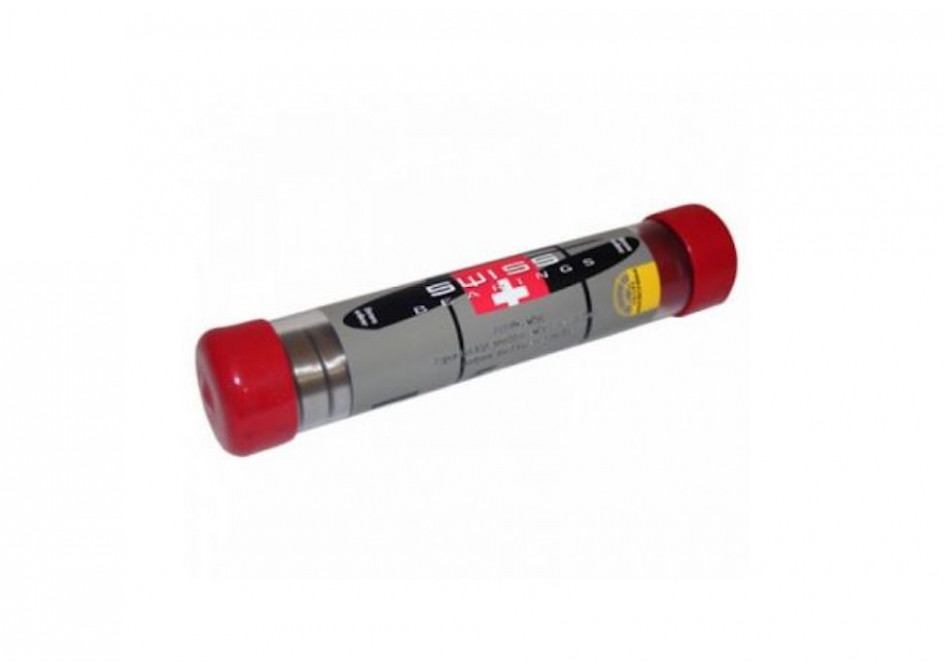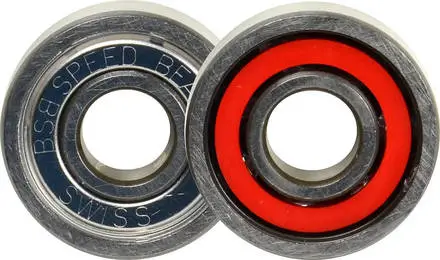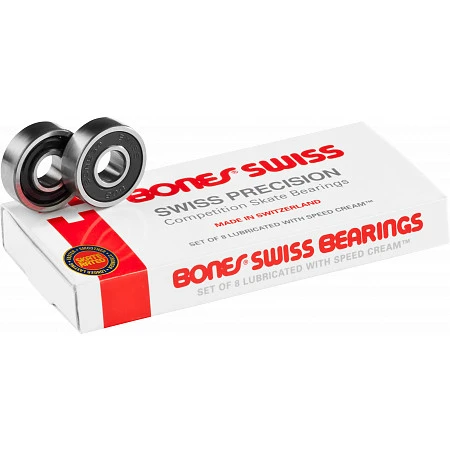What are Swiss Bearings?

Swiss bearings are very famous for their great quality and accuracy, which is the reason why professional and competitive inline skaters buy them as they expect something that would be awesome from their skills with the wheels. These bearings are devised with the best raw materials and techniques of manufacturing that allow them to have exact dimensions and tolerances that are much more than common-grade bearings. This will assure users with smoothness, steadiness, and low friction, which are the main elements that roll, making it easier to achieve decent speed and improve riding safety on the road or track.
Firstly, Swiss bearings are characterized by their improved speed, which is important because they are made accurately and have a perfect surface. This leads to cutting the friction and thus the wheels move faster. Thus, it can be very useful for the inline skaters in the case they are forced to skate at high speeds.
One more advantage of Swiss bearings is that they are more durable than conventional ones. Swiss bearings are merely what they say they are, high-quality products made of raw materials like chrome steel or ceramics and therefore are not prone to wear and tear. In effect, such bearings can be used for a long time and maintain top performance even under harsh conditions early.
In addition, Swiss-made bearings are superior to regular bearings. Thanks to the fact that they are made to a very high degree of precision, they are more regular and predictable when skating. It can be critical for someone into inline skating who must be able to direct the skates just the way he wants to, especially when he needs it to be right or go around the bothersome parts.
For those inline skaters who are determined to maximize the potential of their skates, Swiss bearings are an attractive alternative. Swiss bearings give the skaters better performance, longer endurance, and more speed over regular bearings. Although they may be pricier than the usual ball bearings, the better capability and life span they provide these do not only dope racers can gain from are totally acceptable in view of the contest that drifts some people's mind to the sport of skating. Thus, while beginners or people who skate for fun do not have to get the same performance standards as the roller derby teams that use the Swiss bearings, skaters striving to be at the top should definitely go for the better (Swiss) bearings. On the other hand, casual or recreational skaters may not need the same level of performance that Swiss bearings offer, but for those who want to be ahead in competition, they can be the right choice.
Swiss bearings are quite often utilized by the professional skaters striving to be the best and of course, for the ones who are competing, as they have a lot to offer:
- Faster speed: Swiss bearings are manufactured to a higher standard of accuracy and are given a smoother finish than regular bearings, therefore, they produce less friction and elevate the speed of the skates.
- Longer life: Swiss bearings are crafted out of better materials, and this means that they generally last for a longer period of time than regular bearings, even when they are used extensively.
- Better performance: Swiss bearings are more dependable and are able to maintain the performance as it was supposed to be, which makes it easier for controlling and maneuvering the sports goods.
- Less maintenance: Swiss bearings need a lesser cleaning and maintenance than other bearings simply because they are durable and are very less prone to be damaged and/or undergo wear and tear.
The Swiss rating is a Swiss Bearing's way of grading their product to indicate their aptitude in precision and the quality of their products. The Swiss rating system was created by the Swiss company SKF, which by the way is a well-known and recognized manufacturer of inline skates and many other advanced industries.
The precision and quality of Swiss bearings are graded on a scale known as the Swiss rating system, which ranges from ABEC-1 to ABEC-9. Those bearings that have a higher number are constructed better and have a better finish, so they work as expected. Despite that, it must be noted that the ABEC rating system was initially developed for industrial applications and thus may be not a suitable option for inline skating. Within the inline skating circle, yet some of them endorse the import of Swiss bearings that are of qualitative standards such as ABEC-5 and ABEC-7, while others prefer ones that have no rating.
Some Swiss bearings may be as well offered in the form of other quality indicators like: the number (count) of the balls, the material chosen for the balls and races, as well as the type of lubricant. These factors also influence the performance and durability of the bearings.
The Swiss rating is merely one of the aspects to take into consideration when purchasing Swiss bearings for inline skating. One should also take into account whether bearings are suitable for their skill level and skating style, as well as the type of skating they will be doing. A good skate shop or online retailer can help you select the right bearings for your needs.

History of Swiss Bearings
Swiss bearings in which duals have a long and interesting history in the world of inline skating. Here are some key events and developments that have shaped the use of Swiss bearings for inline skates:
- In the 1980s, inline skating emerged not only as a leisurely pursuit but also as a competitive sport. Consequently, the trend was transformed, and the skaters wanted bearings that could deliver better performance and higher speeds.
- The SKF, a Swiss company that manufactures a wide range of bugbearers, has in its line-up bearings that meet the needs of different industries, such as skateboarding and inline skiing. The Swedish company SKF defined itself with precision and its series of highly qualitative products and razor-thinness, they also established themselves among inline skaters in no time as the bearing brand with the best quality.
- Inline skating replaced ice skating as kids' favorite sport in the 1990s, and these bearings became a hit among young children who began using them in their roller skates. Moreover, other skaters were forced to produce some imported skateboards, which led to the rise of the name "Swiss bearings".
- In the very early 2000s, several manufacturers with no manufacturing plant in Switzerland made bearings marketed under the brand names "Swiss" or "Swiss-like" names. Such an event made skaters unsure whether a Swiss bearing is the one made in Switzerland or not.
- In 2005, SKF adopted a rating system called the SKF rating system, which replaces the ABEC rating system that had been used in the past years. Now, instead of ABEC, the new system SKF offers is a proper rating system that accepts criteria such as load-bearing ability, speed, and the temperature that the bearings are exposed to.
The Bone Swiss bearings are still loved by the majority of inline skaters who want to get the most out of their skates. Although it's right that there is a multitude of different bearings for inline skates, Swiss bearings are still the top choice of inline skaters who want to reach a competitive level and also the racers.

Swiss Bearings vs Classic Bearings
Quality, precision, durability and performance do differ between Swiss bearings and classic bearings. Here are some key differences between Swiss bearings and classic bearings:
Quality and Precision:
Swiss bearings that blend finely crushed silica that is re-processed as well as ceramics that are plasma-sprayed, with classic bearings which are built sloppily and inexact and have much less precision, are thus gaining publicity at a degree every day. Swiss bearings are the equipment with the highest level of precision. On the one hand, it is also their use of premium materials, which has them stand out in the competition as most of the mentioned materials are more durable and lightweight and wear-resistant. Swiss bearings are the ones that are reputed to be more consistent, offer a smoother riding and run faster than a classic ball bearing.
Durability:
Swiss bearings exhibit a longer life than typical bearings. The factors of these are the use of high-quality materials in their construction sectors and the technology of high precision. The process insures that the products are not easy to corrode, and minimize the wear and tear issue, resulting in less maintenance over time.
Performance:
Swiss bearings are way ahead of the classic ones in their performance. In the case of Swiss bearings, they offer a lower frictional force and a more even movement which results in higher maximum speeds and better a control. They are the first choice for those who are the most demanding and want the most of their speed equipment.
Price:
Swiss bearings are usually more expensive than classic bearings. The regular use of high-quality materials and production technology for manufacturing bearings requires precision. However, the performance and strength of Swiss bearings can reach high levels, so, in the final analysis, they can be cost-efficient for committed skaters.
Swiss bearings are the most precise, durable, and a very high-quality option compared to classic bearings. While they are more expensive, they provide better performance and a longer lifespan when set side by side to classic inline skate bearings, with skaters who seek top-quality gear that doesn't suffer from wear and tear. For amateur skaters or persons with a limited budget, classical bearings may suffice; Swiss bearings are, nevertheless, among the top choices for enthusiasts or those who want to win competitions.
